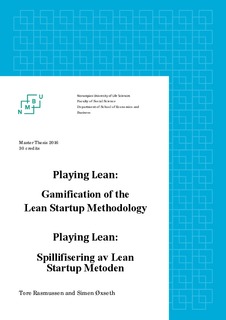| dc.contributor.author | Rasmussen, Tore | |
| dc.contributor.author | Øxseth, Simen | |
| dc.date.accessioned | 2016-04-05T13:22:20Z | |
| dc.date.available | 2016-04-05T13:22:20Z | |
| dc.date.issued | 2016-04-05 | |
| dc.identifier.uri | http://hdl.handle.net/11250/2384042 | |
| dc.description.abstract | Gamification and the Lean Startup methodology have become buzzwords in academic
literature and form the basis for this thesis. The philosophy and method of Lean Startup has
received increased attention in entrepreneurship and business practices. Gamification as a
concept has recently emerged and entered the field of learning in a range of areas, from
business to education. The topic of this thesis is gamification as a tool to learn
entrepreneurship and innovation methodology, represented by Playing Lean, a board game
innovation developed for learning the Lean Startup Methodology (LSM). There are several
studies on learning effects from gamification and on game-based learning, but there are few
studies on entrepreneurship and innovation games, and no known studies on games with an
emphasis of conveying the Lean Startup Methodology.
The object of study will be Lean Friends AS's application of the board game Playing
Lean as educational learning tool for understanding the Lean Startup Methodology, facilitated
in workshops with introduction and debrief. The purpose of the research is to reflect upon
how gamification works and whether Playing Lean meets the purpose of making people
understand the method. We investigated how players experienced playing the board game,
how specific game elements and mechanics functioned and the learning outcome of the LSM.
The research question we formulated to meet this purpose: How does gamification contribute
to learn the Lean Startup Methodology? A subordinate purpose is to investigate if this
contributes to learning entrepreneurship in a meaningful way.
The qualitative research approach we used was explorative and pragmatic, using
mixed methods approach to collect various forms of data to compare. We have collected data
from observation, questionnaires and group interviews/focus groups from Playing Lean
Workshops (PLW), interviewed five players and one of the creators of the game. We used
empirical data and secondary data to reflect on gamification in our discussion. Our results
points towards a positive learning outcome in general and that elements like social learning,
facilitator and use of storytelling were effective to learn. The PLW was an entertaining
experience for the players and a good introduction for beginners. Further research on
gamification can assist in improving instructional games for practitioners and game
developers. | nb_NO |
| dc.description.abstract | Begrepene Gamification og Lean Startup har blitt moteord i akademisk litteratur og står
sentralt i denne oppgaven. Lean Startup filosofien har spesielt fått mye oppmerksomhet innen
entreprenørskap og forretningsverden. Gamification som konsept er forholdsvis nytt og har
entret læringsfeltet på flere områder, fra forretningsverden til utdanning. Temaet for denne
oppgaven er gamification som et verktøy for å lære entreprenørskap og innovasjons metodikk,
representert ved Playing Lean, en brettspillsinnovasjon utviklet for å lære bort Lean Startup
metodikken (LSM). Det foreligger mange studier på læringseffekten av gamification og
spillbasert læring, men det er få studier på entreprenørskaps- og innovasjonspill, og ingen
studier på spill med fokus på å lære bort Lean Startup metodikken.
Oppgavens fokus vil være på Lean Friends AS sin anvendelse av brettspillet Playing
Lean som et utdanningsverktøy for å forstå Lean Startup Metodikken, fasilitert gjennom en
workshop som inkluderer en introduksjon og avsluttende refleksjonsdel. Målet med denne
forskningen er å reflektere over hvordan gamification virker og hvorvidt Playing Lean oppnår
målet med å formidle Lean Startup metodikken. Vi undersøker hvordan spillere opplever
brettspillet, hvordan ulike spillelementer og spillmekanismer fungerer og LSM
læringsutbyttet. Forskningsspørsmålet vi har utviklet for å besvare dette er følgende: Hvordan
bidrar gamification til å lære Lean Startup metodikken? Sekundært ønsker vi å undersøke om
dette bidrar til å lære entreprenørskap på en meningsfull måte.
Den kvalitative forskningstilnærmingen vi benyttet var eksplorerende og pragmatisk,
med bruk av en blandet metodetilnærming til å samle og sammenligne ulike typer data. Vi
samlet data gjennom observasjoner, spørreskjemaer og gruppeintervjuer/fokusgrupper fra
Playing Lean workshops (PLW), intervjuet fem spillere og en av skaperne av spillet. Vi har
benyttet primær- og sekundærdata til å reflektere over spillifisering i vår diskusjon. Våre
resultater indikerer et generelt positivt læringsutbytte og at elementer som sosial læring,
fasilitator og bruk av historiefortelling var effektive for å lære. PLW var en underholdene
opplevelse for spillere og en god introduksjon for nybegynnere. Videre forskning på
gamification kan bidra til å forbedre instruksjonsspill for praktikere og spillutviklere. | nb_NO |
| dc.language.iso | eng | nb_NO |
| dc.publisher | Norwegian University of Life Sciences, Ås | |
| dc.rights | Navngivelse 3.0 Norge | * |
| dc.rights.uri | http://creativecommons.org/licenses/by/3.0/no/ | * |
| dc.subject | Lean Startup | nb_NO |
| dc.subject | Gamification | nb_NO |
| dc.subject | Playing Lean | nb_NO |
| dc.subject | Entrepreneurship Learning | nb_NO |
| dc.subject | Entrepreneurship | nb_NO |
| dc.subject | Lean Startup Methodology | nb_NO |
| dc.subject | Innovation | nb_NO |
| dc.title | Playing Lean : gamification of the Lean Startup methodology | nb_NO |
| dc.title.alternative | Playing Lean: Spillifisering av Lean Startup Metoden | nb_NO |
| dc.type | Master thesis | nb_NO |
| dc.subject.nsi | VDP::Social science: 200::Economics: 210::Business: 213 | nb_NO |
| dc.source.pagenumber | 128 | nb_NO |
| dc.description.localcode | M-EI | nb_NO |

